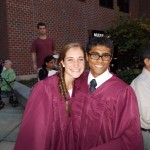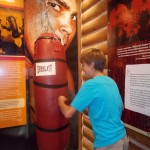Seeking the Greatest While Feeling Ordinary
It doesn’t surprise me one bit, and I know it won’t surprise you either, that my recent Road Trip in the Heartland (starting and ending in Indianapolis) provided about as many examples of my beloved side-by-side contrasts as there were corn stalks needing rain. I’m choosing just one to think about right now.
How close together or far apart are “extraordinary” and “ordinary”? How about “The Greatest” and “The Normal Person”?
During our second stopover in Louisville, Kentucky, my son and I got a chance to visit a wonderful place on the banks of the Ohio River: the Muhammad Ali Center. We went partly in deference to the other son now in college, who first took up the sport – and has stayed with it — after doing a high school research project on Ali. When The Fighter came out, a couple of years ago, I wrote an essay about how it felt to be thrust into the role of boxer’s mother, along with my usual role of clergy spouse. Dropping by this unusual museum/cultural center definitely was on our list of things to do, but we got so much more than what we expected. In fact, the place delivered a knockout punch – in a good way, I mean.
You can watch a clip of the 12 year old future Champ running through the streets of Louisville, see a bunch of famous fights, practice on both a speed bag and a heavy bag, get boxing instruction from his daughter on a screen while you stand in a ring, learn why he holds up six core values (respect, confidence, conviction, dedication, charity, and spirituality), get in-depth visual and audio history about both the Vietnam War and the Civil Rights movement, listen to children from around the world describe what they hope for, and participate in a number of interactive exhibits which prompt you to consider how you, too, can follow Ali’s lead – as a humanitarian, Part Two of his life — and choose to make a real difference in your community and in the society as a whole.
Suffice it to say that, with just one morning available, we never made it to the Louisville Slugger Museum, just a few blocks away. Feel free to write me about it.
So the same guy who achieved fame not only for rising to the top in a violent sport but also for non-stop boasting—this same guy becomes a role model for youth? You better believe it. Check out this new initiative: “Generation Ali“. The slide show begins with these sentences: “By passing the torch to a new wave of champions, Ali challenges us to transform ourselves and our communities. The greatest is yet to come. You’re next.” This takes me right in, and I’m not even 20.
As if the museum didn’t provide contrasts enough, during the same week I also read a New York Times article sent to me by a friend, and sent to her by our high school principal. With the title, “Redefining Success and Celebrating the Ordinary” the article is about why it is that teenagers these days get so many messages about the need to set themselves apart from others, to excel, to stand out. Some adults are objecting now, wondering what’s so terrible about being normal or – gasp! – average. Who gets to be The Greatest at anything? Hardly anybody, that’s who. In the long run, our kids will be much better off if they are prepared to accept being unexceptional at most things – no matter what the college admissions game has become.
As one who has just gone through the graduation of a second child from high school, I heartily agree. When I watched my daughter sitting in a sea of other maroon gowns, I was happy thinking mostly about the diversity of classmates she had known and about her own recognition that she was part of a whole. Sure, there was pride in her particular successes…but that feeling did not dominate. 
From the Times article, I learned that David McCullough Jr. gave graduating seniors at Wellesley High School a message that may have raised some eyebrows at that ceremony: “You are not special. You are not exceptional.” He was no doubt trying to provide some kind of antidote to the constant showering of compliments that many students have come to expect, sometimes without really achieving all that much.
This reminds me of one of my brother’s favorite words to describe something he likes. If a small town or an experience or maybe even a person is genuine, not trying to be better than the rest, he calls it or him or her “regular.” Coming from someone who can’t stand pretense, the word really means “completely fine, decent.”
And yet, my visit to the Ali Center reinvigorated my sense that trying for genuine greatness—especially the kind that benefits others — is still mighty fine, too. In the final exhibit, we watched a film of Ali – with hand shaking from Parkinson’s – straining to raise the torch at the Atlanta Olympics in 1996. Various people talk about how that moment inspired them, and then the screen goes dark and you’re looking only at yourselves, in a mirror, amidst a whole lot of torches next to you. A voice says something like, “What will you do to reach for your best, to make an impact where you can?” There we were, ordinary people on an ordinary day, left wondering.



